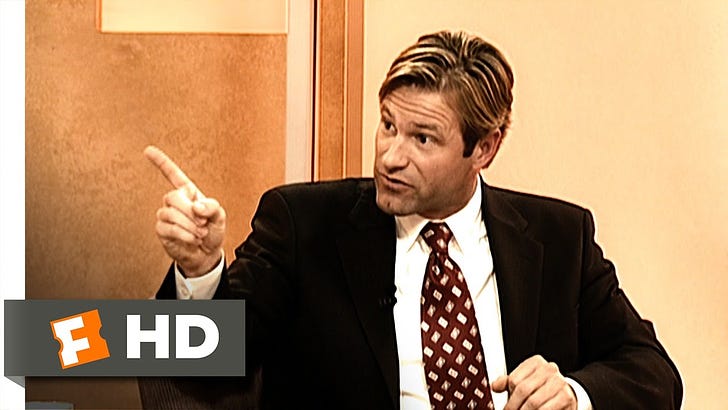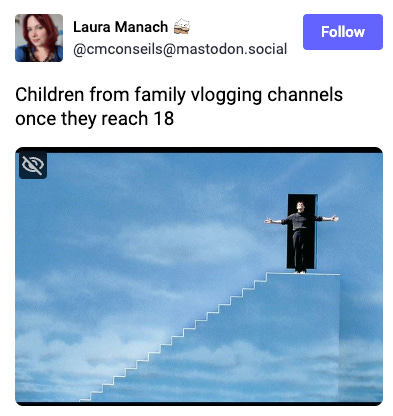🥼 203 - The Gell-Mann Amnesia Effect
Never send a molecular biologist to do an anthropologist's job.
[Michael] Crichton coined the term Gell-Mann amnesia effect to describe the phenomenon of experts reading articles within their fields of expertise and finding them to be error-ridden and full of misunderstanding, but seemingly forgetting those experiences when reading articles in the same publications written on topics outside of their fields of expertise, which they believe to be credible.
He explained that he had chosen the name ironically, because he had once discussed the effect with physicist Murray Gell-Mann, "and by dropping a famous name I imply greater importance to myself, and to the effect, than it would otherwise have."
–Daniel Kilov, The brittleness of expertise and why it matters
How much weight should expertise and authority carry? And when are the wrong experts called in to give their opinions? An article by Naomi Oreskes points out that predictions of what countries would have the best response to a pandemic were proved false after the COVID outbreak. No social scientists were involved in making these predictions, and political actions and social pressure turned out to be important variables in an active pandemic response.
The limits of expertise can make for useful storytelling conflict. Do you have a protagonist following their own path, or butting heads with people with long-held or traditional beliefs?
In Ghostbusters, the main characters present themselves as experts in their fields, but are challenged by authorities who never cracked open Tobin’s Spirit Guide. At the scene level, Walter Peck is an expert on environmental regulations and bureaucratic power. But when he orders the Ghostbusters to shut down their spirit containment field, his confidence nothing will go wrong quickly disappears:
Are you familiar with accounts of the morning routines of successful people? Marina Koren pokes holes in the idea that knowing what a CEO has for breakfast, or how early a famous athlete wakes up to jump into an ice bath has any relevance as a guide for most people:
While everyone has the same 24 hours in a day, not everyone has the wealth to make time for an hour on the treadmill by delegating tasks to personal assistants, nannies, and chefs. Nor does everyone benefit from making morning saintliness a part of their public image.
If you prefer a demonstration, Isaiah Photo attempts the documented morning routines of Cristiano Ronaldo, Mark Wahlberg, and Dwayne Johnson. It does not go well for him.
Putting this into dramatic use, consider the sequence in Men in Black where Will Smith’s James Darrell Edwards III is brought in with a group of potential candidates for a secret job:
All the other candidates he’s up against are traditionally successful, including decorated service members. But all of their expertise fails to help them in the challenges they’re presented. James isn’t following the same script, and assesses each challenge on its own terms.
This becomes most obvious on the shooting range, where every other applicant gets trigger happy, but James reasons out which target to fire at and why. Also pay attention to the moment when he drags the table across the room, disturbing the other test takers, so he can better fill in his answers. The other applicant he offers table space to wordlessly declines. It’s a sign he thinks James is deviating from the accepted, proper methods.
Lack of proper expertise can work as a tactic for the unscrupulous. Mike Rugnetta presents this as the Authority Fallacy, where an appeal is made to someone’s expertise on a subject, but that person may not have relevant knowledge for the particular topic. You can see this play out in a scene from The Simpsons, where Mr. Burns uses an actor portraying Charles Darwin to defend Burns against claims his nuclear power plant’s pollution lead to a mutated fish. Matt Colburn breaks down the tactics involved:
Consider drawing on some of the ways this plays out in the real world:
Jacob Kushner looks at how Germany’s far right politicians abuse their appearance of authority to stoke apocalyptic fears about immigrants when everything they say can be proven false.
Ingrid Schmidt directs our attention to how more billionaires are building survival bunkers because they learned Mark Zuckerberg has one (and assume he knows something they don’t).
Cory Doctorow underlines how the belief in jet packs becoming common was based on salesmanship and fake experts, and how this same kind of futuristic hucksterism plays into how supposed experts present AI and self-driving cars.
Tobacco lobbyist Nick Naylor from Thank You For Smoking offers an example of the aggressive use of a seemingly authoritative argument to overcome actual expertise:
In this scene, Naylor undermines a scientist with a skewed angle on defending cigarette manufacturers. The scientist sees greedy capitalism pushing a product that demonstrably hurts people. Nick challenges this by saying that if the companies he represents were actually greedy, it would be in their best interest to make sure each and every smoker has a long life to continue consuming their product. With poise and determination, Naylor wins over the audience and seemingly gives Big Tobacco the moral high ground in this argument.
When writing a character like this, it’s important to understand their terms of engagement. Naylor doesn’t necessarily believe what he’s saying. As he explains to his son, his job isn’t to win an argument, but make his opponent lose:
What role do authority figures or experts play in your story? Are they meant to be trusted by the other characters? By the audience? Do they have the knowledge they need to face the conflict before them, or are they out of their depth?
👋 Are you new here?
Inneresting is a weekly newsletter about writing and things that are interesting to writers. Subscribe now to get more Inneresting things sent to your inbox.
Previously on Inneresting…
In case you missed it, last issue’s most clicked link Brandon Sanderson divides heist stories into two archetypes, Ocean’s 11 heists and Italian Job heists, and explains how the difference between their scenes of planning and preparation create different audience expectations.
What else is inneresting?
Via reader Marion Agnew, a look at the changes in language and accent of scientists stationed in Antarctica.
Emily Post would never: Neven Mrgan on how it feels to receive an AI-generated email response from a friend.
Caitlin Dewey reverse-image-searches products she buys online, because sometimes one company makes the same lamp for three different sellers (who charge three different prices).
And that’s what’s inneresting this week!
Inneresting is edited by Chris Csont, with contributions from readers like you and the entire Quote-Unquote team.
Are you enjoying this newsletter?
📧 Forward it to a friend and suggest they check it out.
🔗 Share a link to this post on social media.
🗣 Have ideas for future topics (or just want to say hello)? Reach out to Chris via email at inneresting@johnaugust.com, Mastodon @ccsont@mastodon.art, or Bluesky @ccsont.bsky.social




